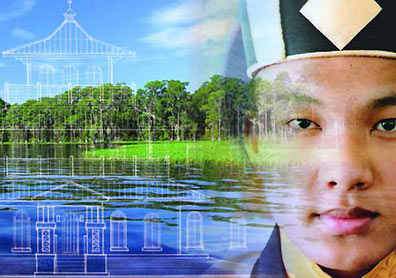 Dharamsala:
Dharamsala: Tibet is highly vulnerable to climate change and what happens there matters greatly to the rest of mainland Asia, the 17th Karmapa Ogyen Trinley Dorje, who is the third most important Tibetan religious head, says in a yet-to-be-published write-up.
"It's an unfortunate fact that the temperature of the Tibetan plateau is increasing faster than most other places on earth due to climate change. I know there will be severe consequences for Tibet's vast grasslands, and it saddens my heart," said the article titled "Walking the Path of Environmental Buddhism through Compassion and Emptiness".
It will appear in Conservation Biology, a prestigious scientific journal, in its 25th-anniversary edition next month.
The Buddhist monk observes that the effects of climate change on the Tibetan plateau will not occur in isolation.
"Tibet is the birthplace for Asia's great rivers: the Indus, Ganges, Brahmaputra, Irrawaddy, Yangtze, and the Mekong. Tibet is sometimes called the Third Pole because it stores the most ice and water after the Arctic and Antarctic.
"If its water sources dry up or become contaminated, there will be fateful consequences for over a billion people. Because glacier melt is increasing as temperatures increase, both floods and water shortages will increase in the near future."
According to him, the Brahmaputra is under grave threat from dams and the Indus no longer reaches the sea.
The Karmapa, who turned 26 June 26 and resides in a monastery on the outskirts of this town, says he was born into a Tibetan nomad family.
"When I was four or five years old, there was a severe drought and the local spring in our camp began to dry up. Our community requested my father ask me to plant a sapling at the source of the spring… my love for nature and dedication to protect the environment sprouted from this seed."
The Karmapa, who now resides in a monastery on the outskirts of this town from where the Tibetan spiritual leader, the Dalai Lama, heads his government-in-exile, says during the last 100 years, over 95 percent of the world's wild tigers have vanished.
Appealing to the followers of Tibetan Buddhism to go vegetarian and stop animal slaughter, he says: "The magnificent tiger has almost completely disappeared due to consumer demand for its skin and body parts. We are driving a species to extinction simply because we believe wearing its skin makes us look wealthy or that consuming tiger parts will make us healthier. Doing such a thing is essentially non-Buddhist and
uncompassionate."
Narrating his experience of going vegetarian, the monk said: "Although I had considered giving up eating meat for many years, I became a complete vegetarian only a few years ago. Somebody presented a short documentary that showed how animals suffer before and during the act of killing. Watching it, I could feel the fear felt by the animals. Like a thunderclap, I became aware that these living beings were suffering so greatly simply to satisfy my habitual preferences. Eating meat became intolerable for me at that moment, and so I stopped."
He asks questions: will we allow the sea to rise and cover the Pacific islands and the Himalayas to be reduced to bare rock? Will we let amazing wildlife species become extinct and simply fade to a story that is told in future generations? Should thriving forests be turned into farmlands to meet our unending demands?
According to the Karmapa's official website, the invitation to contribute to the journal was extended to the Karmapa in recognition of his role as young religious leader who can not only influence and inspire others but who has also demonstrated his own commitment to take action on environmental issues.
The Karmapa, who fled Tibet and sought refuge in India in January 2000, is the spiritual head of the Karma Kagyu school, one of the four sects of Buddhism. He is considered the third most important Tibetan religious head after the Dalai Lama and the Panchen Lama.
 Dharamsala: Tibet is highly vulnerable to climate change and what happens there matters greatly to the rest of mainland Asia, the 17th Karmapa Ogyen Trinley Dorje, who is the third most important Tibetan religious head, says in a yet-to-be-published write-up.
Dharamsala: Tibet is highly vulnerable to climate change and what happens there matters greatly to the rest of mainland Asia, the 17th Karmapa Ogyen Trinley Dorje, who is the third most important Tibetan religious head, says in a yet-to-be-published write-up.